It's a scorcher out there, at least when the skies are not opening up and causing a soggy mess. Summer has arrived with a vengeance in South Florida, and so have film releases that are summer movies in every sense of the word. Oh, sure, now that multiplexes are steadily returning to something resembling normalcy, the studios are bringing out their screen-clogging big guns. But there are also lower-profile titles arriving on these shores where the actual season plays a defining role.
This week, two such movies open locally. One of them is a genre-splicing ensemble piece that celebrates spoken verses and the city of Los Angeles circa 2019 with a director that has Miami roots. The other is a period coming-of-age story from a renowned filmmaker about a summer fling where the longing and heartache are served with a side of gallows humor. Let's dive in.
“Summertime”: A diverse, multi-ethnic, LGBTQ-inclusive, predominantly young cast. A loose structure that moves from one scenario to another, ceding the spotlight to poetry created by the more than two dozen aforementioned stars. And the streets of La La Land, where good luck and misfortune swirl together like a warm breeze. The sophomore live-action effort from director Carlos López Estrada boasts many elements working in its favor.
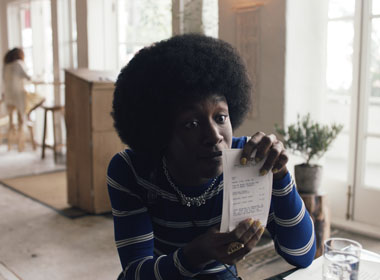
Tyris Winter in a scene from "Summertime." Photo courtesy Good Deed Entertainment.
So why does sitting through this musical feel like being subjected to the sound of fingernails on a chalkboard?
Let's begin with the way it unfolds. Starting in bohemian Venice Beach, “Summertime” snakes around the City of Angels and follows its young dreamers as they vent, dish, wax nostalgic and share their frustrations and aspirations. The closest thing it has to a protagonist is Tyris (Tyris Winter). Black, queer and cheeky, Tyris sports a big afro and an even bigger chip on his shoulder. When we first see him, he's hanging out with two girlfriends at a restaurant that's recently undergone a change in management. The exorbitant menu prices prompt him to fire off a scathing Yelp review, and the situation escalates when a rude server threatens to call the cops if he refuses to pay for his order.
Cue the verbal attack in verse, which aims for mic-drop defiance but mostly succeeds in coming across as a live-action version of a Twitter thread aiming to shame its target. It stops the film in its tracks, makes Tyris come across as insufferable brat and turns a plausible dining nightmare into improbable wish fulfillment.

Mila Cuda in a scene from "Summertime." Photo courtesy Good Deed Entertainment.
López Estrada keeps coming back to Tyris as he reveals a more vulnerable side underneath the sassy exterior, but it's all for naught. It's tough to connect with these struggling Angelinos, because their attempts to open up keep getting undercut by the intrinsic falsity of how these (frequently expletive-laden) revelations are doled out. For example, transit bus rider Mila (Mila Cuda) recites an out-and-proud declaration, the poem “Hey, I'm Gay,” when she's triggered by another passenger asking an older lesbian couple to lay off their PDA. The moment should be celebratory, but it's staged so awkwardly that Cuda's conviction crosses over into grating self-indulgence.
So on and so forth. A pair of down-on-their-luck street rappers score a record contract by being in the right place at the right time. An estranged couple express their issues with one another in a therapy session that threatens to become a slam poetry showcase. A young graffiti artist manages to keep getting away with his rather uninspired tags. A woman stalking his ex spouts off a self-realization wish list. A burger joint employee finds himself promoted during a shift from hell. The profane, earache-inducing rhymes flow like a stream while the well of logic runs dry.
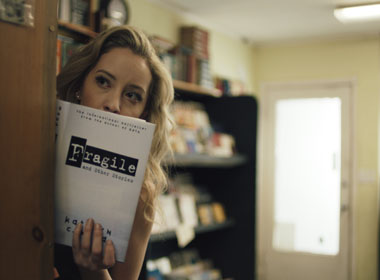
Maia Mayor in a scene from "Summertime." Photo courtesy Good Deed Entertainment.
For movie buffs, the shifting perspectives, as the film jumps from one outspoken character to another like a virus, might remind them of “La Ronde” (1950), Max Ophüls' mosaic of interconnected vignettes about the whims of the human heart, or perhaps the more geographically aligned “Short Cuts” (1993), Robert Altman's star-studded screen adaptation of stories by Raymond Carver, also set in Los Angeles.
But as López Estrada sets up one bristling confrontation after another, the film that's likely to come to mind is one that's more recent and far better known: “Crash,” Paul Haggis' hamfisted meditation on race relations across a wide cross-section of LA residents. The exhausting righteousness in the delivery of these poems certainly reminded this critic why he just couldn't get into the widely overpraised “The Last Black Man in San Francisco.”
In mixing genres and ensuring his stars' writing takes center stage, López Estrada aims to craft something that feels fresh and new. The filmmaker clearly has his heart in the right place, much as he did in his debut feature “Blindspotting,” but once again, he trips on his ambition, done in by poor creative decisions and tonal whiplash. (In between his live-action efforts, López Estrada co-directed Disney's decent-enough adventure “Raya and the Last Dragon.”) Like in “Blindspotting,” “Summertime” sets up a climactic confrontation that shows a character confronting personal demons. In this case, Marquesha (Marquesha Babers), a heavy-set young woman, faces the ex who shunned her, but the soul-baring moment, a poem titled “Shallow,” is pitched so high that whatever catharsis that could have been derived from it gets lost in all the sound and fury.
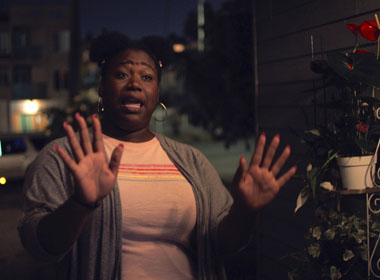
Marquesha Babers in a scene from "Summertime." Photo courtesy Good Deed Entertainment.
Does all of “Summertime” fall prey to its icky self-help vibe? No. A few sequences are rather touching. A shrewdly assembled montage gives us a peek into the homes where Tyris' girlfriends live. Bickering between a Mexican American teen and her strict mother at a restaurant gives way to a dance routine that unfolds like a daydream. A Korean family working the kitchen of a restaurant bring a no-frills authenticity that's in scant supply elsewhere. And López Estrada saves the best for last: Raul Herrera, playing a limo driver with a heart of gold, delivers his poem “Clouds” and closes the film with the kind of hopeful spark, and welcome restraint, that eludes most of what has preceded it.
The ending underscores that baffling irony of this strident misfire. How can a project that's billed as a collaborative endeavor be so self-absorbed? How can a movie that strives to keep it real be swallowed whole by its fantasies? But that's the sorry case with “Summertime.” It amounts to a high-wire act of the self-serving kind.
“Summer of 85”: A bad day on the water sends a virginal, closeted teen on a collision course with destiny in this tale of first love and dark impulses from François Ozon. In bringing British author Aidan Chambers' young adult novel “Dance on My Grave” to the screen, the prolific French filmmaker puts his queer gaze and penchant for mystery to good use and, as he is prone to do, messes with our heads, plays with our emotions and asks us to question our investment in the characters.

Benjamin Voisin and Félix Lefebvre in a scene from "Summer of 85." Photo courtesy of Music Box Films.
The French-Belgian co-production opens with a “meet cute” of sorts, as Alexis Robin (Félix Lefebvre) borrows a friend's sailboat and finds himself stuck in a thunderstorm all by himself. To the rescue comes David Gorman (Benjamin Voisin) like a gallant knight. The handsome stranger pulls the green, inexperienced Alexis from the water and into his arms.
But don't expect a tender romance to come out of this encounter. Actually, don't get too attached to lean, hunky David. What you are seeing is a flashback, as Alexis, who we soon learn has gotten himself in trouble with the police, recounts his relationship in ways that make you wonder just how reliable a narrator he is. He has to deal with a detective who intuits he knows more than he's letting on and with schoolteacher Monsieur Lefèvre (Ozon regular Melvil Poupaud, sporting a pornstache), who acts as a go-between between the teen and the authorities and coaxes Alexis into writing about his experiences.
What is unequivocally true is that David is dead, a fact that casts a pall over the sun-dappled affair that blooms between the boys. Did David have anything to do with it? He's not exactly an open book when it comes to that.
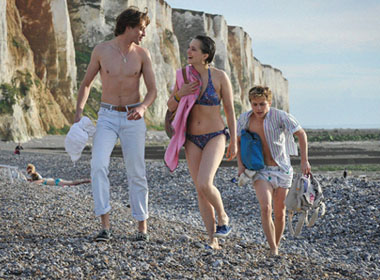
Benjamin Voisin, Philippine Velge and Félix Lefebvre in a scene from "Summer of 85." Photo courtesy of Music Box Films.
But Ozon is aware that you're probably here to watch good looking teens being adorable and hooking up in an attractive setting, and in that regard, he delivers the photogenic goods. The setting is a coastal Normandy town during the titular season and year, and the director gets all the mid-1980s details just right in a way that feels lived in as opposed to period dress-up. Hichame Alaouie's evocative 16mm photography, coupled with the easygoing chemistry between Lefebvre and Voisin, make it all go down easy. The cherry on top is Ozon's use of The Cure's “In Between Days.”
A montage of the good times Alexis and David spent together (a requisite motorcycle ride is in there) is nicely rendered, but it feels like a setup, because as it happens, the couple's bliss is short-lived. Alexis, the younger of the two, wants more commitment from David, who is soon seen hanging out with English visitor Kate (Philippine Velge).
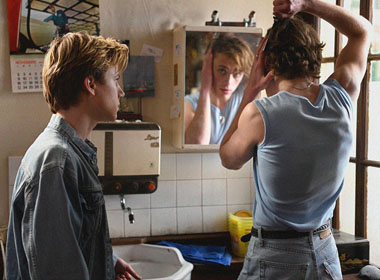
Félix Lefebvre and Benjamin Voisin in a scene from "Summer of 85." Photo courtesy of Music Box Films.
You feel Ozon watching the simmering resentments and sinister turn of events from on high. A cerebral detachment is par for the course when it comes to his output, and you learn to accept it as part of the way he processes the material. In “Summer of 85,” the “Swimming Pool” and “8 Women” director uses that distance to his convenience, but to some extent, also to the film's detriment. He fluctuates between sincerity and bemusement in ways that are alternately illuminating and off-putting. A scene featuring cross-dressing, for instance, probably looked better on paper than the way it plays out.
Comparisons to “Call Me by Your Name” are inevitable, but the two films' energies are pretty different beyond their thematic similarities. One embraces the romance wholeheartedly, the other uses it to comment on the nature of infatuation. “Summer of 85's” framing device, as Alexis struggles putting pen to paper about his summer of love, is a tad on the creaky side, but Ozon gets the job done with storytelling economy and an affection for the time period that, in true Ozon fashion, doesn't necessarily translate into affection for the characters. He also fleshes out Alexis' interaction with his own parents and the way David's mother (Ozon regular Valeria Bruni Tedeschi) takes her son's new “friend” under her wing. How the latter relationship shifts is perhaps the film's biggest gut punch.
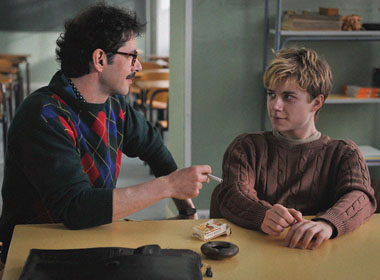
Melvil Poupaud and Félix Lefebvre in a scene from "Summer of 85." Photo courtesy of Music Box Films.
The film's self-referential flourishes have an Almodovarian feel to them, but the filmmaker I thought of the most is James Whale, the director of the 1930s “Frankenstein” and “The Bride of Frankenstein,” portrayed by Ian McKellen in Bill Condon's “Gods and Monsters.” Whale said he tinkered with his genre work in order to make it fun for him, and that's akin to what Ozon is up to here. He gives subject matter that could have easily been depicted in a conventional narrative these extra layers that make the end result play differently depending on the audience.
You can almost hear Ozon giggling behind the camera as he gives literal meaning to the title of Chambers' novel. You feel like you're being played like a piano, but it's a fair exchange, because he has also crafted a sly and absorbing journey of self-discovery engulfed in shadows. Just don't expect this irreverent storyteller to change. This leopard ain't changing his spots.
“Summertime” is now showing at O Cinema South Beach. “Summer of 85” is now showing at Coral Gables Art Cinema with the support of UniFrance, as well as the Gateway Cinema in Fort Lauderdale and FAU's Living Room Theaters.




